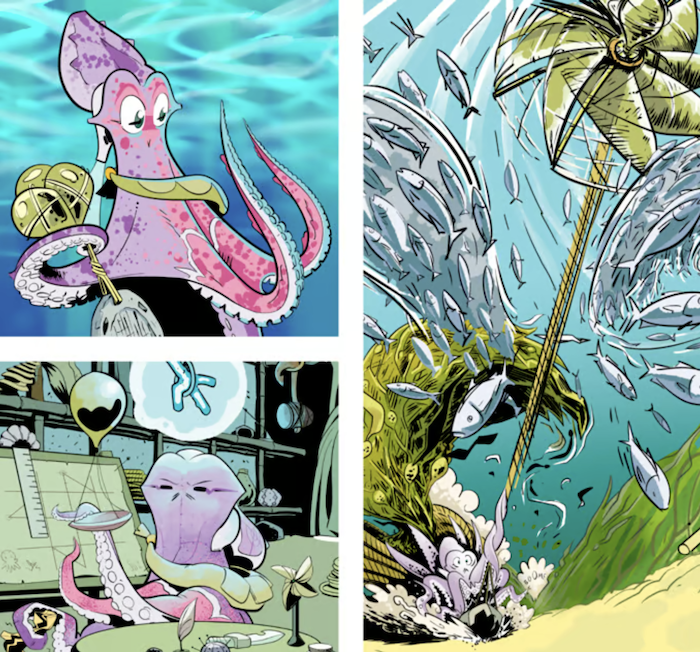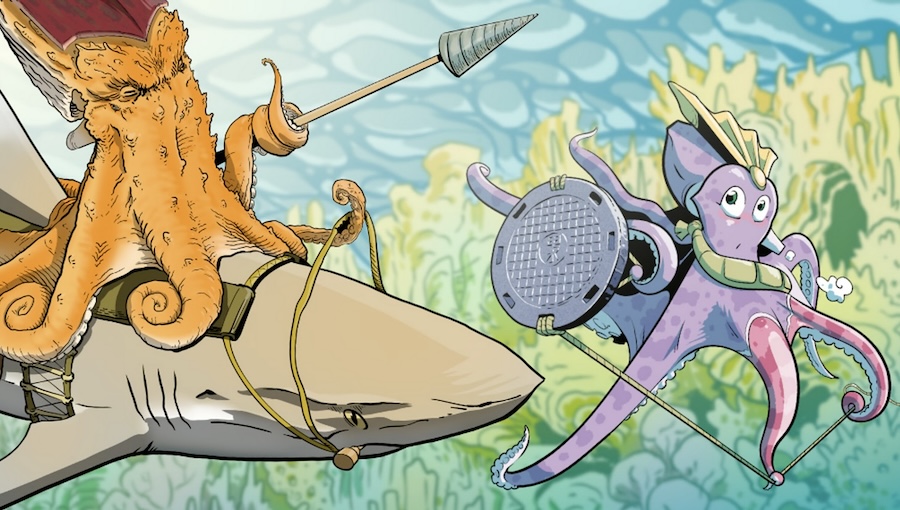The following is an interview with writer/artist Sam Julian on his sci-fi/fantasy comic book series, Octopolis. In this interview, Fanbase Press Editor-in-Chief Barbra Dillon chats with Julian about the genesis behind the futuristic world and characters, the conversations that he hopes the story will initiate amongst readers, and more!
Barbra Dillon, Fanbase Press Editor-in-Chief: First and foremost, congratulations on the recent success of your Kickstarter campaign for the comic book, Octopolis #1! For those who may be unfamiliar, what can you tell us about the premise of this sci-fi/fantasy story?
Sam Julian: Thank you!
Octopolis is set in a future where humans have gone extinct and octopuses have inherited the Earth. All the characters are octopuses, and the story takes place entirely underwater, exploring how this hypothetical society of invertebrates might develop as the dominant intelligent species on the planet.
Issue #1 is all about Kurita, a young female octopus fascinated with the old empire of Octopolis. This mythical past when octopuses possessed advanced technology. She has no idea that it was actually an empire of humans—the idea of an intelligent mammal doesn’t even occur to her. So, when she finds a rusty old manhole cover, she and everyone else thinks it’s a legendary shield. This leads to high-stakes underwater hijinx, especially when her home is threatened by a band of cannibal, shark-riding octopuses!
BD: As both writer and artist, how would you describe your creative process in bringing this world and characters to life on the page, and how – if at all – did your Octopolis Spotify playlist inform or complement this process?
SJ: Octopolis started as a thought experiment— I actually started ‘worldbuilding’ Octopolis long before I had a story in mind. Something like a decade ago, I became fascinated by octopuses. They’re incredibly intelligent despite being invertebrates– more closely related to a clam than to us. The fact that they have this intelligence we as humans can readily recognize and empathize with makes them incredibly important, I think, to our own understanding of life and the nature of consciousness.
I didn’t have such a high-minded reason for my fascination at first, mostly I enjoyed imagining what culture and technology octopuses might develop if they were slightly more social. Their unique aquatic environment and mollusc biology would create a totally unique society. I’ve always loved sci-fi fantasy, and here was a premise that felt rich with potential and, since it’s based on real animals, more authentic than any alien species I might have imagined otherwise.
Since octopuses are so unlike humans physically, I always felt this was the kind of story that I could only tell with a strong visual component, as in a comic. It’s important to me that I anthropomorphize the octopus as little as possible. I don’t want readers to lose sight of the fact that they’re an alien species. My octopuses haven’t developed specialized ‘leg’ arms, or grown mouths in the front of their faces, or migrated to live on land. I try to keep as faithful to their actual biology as I can, within the confines of an adventure story.
That was fine for worldbuilding, but once I started actually writing and drawing the comic, it became a real challenge. It’s tough making all your characters unique and distinct when you can’t give them unique noses, mouths, or hairstyles. Not only that, octopus skin can change shape, color, and texture at any time! When you add in the eight arms each with hundreds of suckers, I felt, at times, I’d bitten off more than I could chew. I don’t think I could have convinced anyone else to draw it, I can tell you that much. But ultimately, I’m happy with the visual style of the comic. I like to think that the limitation has led me to develop a unique style of cartooning these octopuses.
I’m so pleased you listened to the Spotify playlist! That was something that developed over time as I was working on the comic. Music’s a big part of my life and I’m often listening to music when I’m drawing. Anytime I found a song that I felt matched the mood of the comic, I’d throw it in there and listen to it while I was drawing. A lot of the songs in there touch on themes that I want to explore in Octopolis, expressed more succinctly and elegantly than I ever could, so if you want to get some insight into my inspirations, definitely give it a listen. And it’s a living playlist, so I always appreciate music recommendations.

BD: Why do you feel that crowdfunding – Kickstarter in particular – has been such a valuable resources to ensuring the success of today’s comic book creators?
SJ: I have gotten a lot of positive feedback and enthusiasm about Octopolis from folks, especially in the niche marine biology and sci-fi communities I’m a part of. But I never had any luck pitching the premise to traditional publishing editors. I acknowledge it’s pretty difficult to categorize from a marketing and demographic perspective. I mean, it is already a genre mashup of post-apocalyptic solarpunk sci-fi fantasy talking-animal action adventure with educational nonfiction elements. There are no humanoid characters, the animals aren’t even fuzzy, and they lack mouths. The style is cartoony, but the content and themes are too mature for kids, so there’s the risk of it getting miscategorized as middle-grade. I’m really making a great case for it, aren’t I?
But the thing is, there actually are a bunch of people for whom this comic is exactly what they want! Traditional publishing is always going to push you to compromise and make your work more broadly accessible, but for me, that would have diluted all the things that make Octopolis unique and a story worth telling. So, with Kickstarter, I was able to present my vision directly to my potential audience, and it turns out there’s real enthusiasm for it!
There are a lot of creators out there like me, with specific creative visions that appear risky or tough sells on first blush. Crowdfunding is a democratizing force that leverages the internet to support content made for niche communities that otherwise wouldn’t be large enough to warrant a publisher’s attention.
All that said, I’d still be open to traditional publishing! Crowdfunding is SO much work for a single individual, my god. Editors, if you’re reading this, my agent is Jennifer Azantian at Azantian Literary Agency.
BD: At Fanbase Press, our #StoriesMatter initiative endeavors to highlight the impact that stories can have on audiences of various mediums. How do you feel that this story may connect with and impact readers?
SJ: I really appreciate that mantra, because I think it gets at the heart of what it is to be alive. It’s my opinion that we literally are the stories we tell ourselves. Consciousness is basically our brains making sense of all the sensory input we receive by telling ourselves stories about what it means.
So, it really matters whether the story you tell about your own life is a positive one. And when you’re putting a story out into the world, you have to have respect for the power a story has to change someone’s perception of themselves and the world. You’re creating a thoughtform and once it’s out there, you don’t actually have control over it anymore.
I hope the story of Octopolis will spark interest in the diversity of life in our oceans, and more generally, inspire empathy for the Other. Octopuses are about as alien a creature as you can imagine. If you can learn to care about them, it should be easy to care for another human, right?
Personally, working on the story of Octopolis has helped me process all the ways the world is going to shit these days. It sure seems we’re heading straight into a climate apocalypse, and so in Octopolis, I tackled that directly and posited the absolute worst-case scenario for us humans. We screw up the planet so badly we’ve all died off. Humanity has been completely removed from the story. But… the story continues. We’re not the center of it all, never were. Even if we cause the largest mass extinction since the meteor that nuked the dinosaurs, there will still be Life on Earth after we’re gone.
All our stories are about humanity at the end of the day. They’re written by humans for other humans. You can’t avoid it. But I think it’s important to remind ourselves that we aren’t the whole world, that it continues to exist without us, and despite us. I hope that readers of Octopolis will find some catharsis in that, and maybe it will inspire them to treat the world with more respect and empathy the next time they go out and interact with it.
BD: In being mindful that you just wrapped up a massive Kickstarter campaign (and the incredible amount of work that it entails!), do you have future plans to bring Issue #2 to life, as well?
SJ: Absolutely! It’s Octopolis Issue #1, after all. That implies at least an Issue #2. I actually have Issues 2-6 plotted out already, it was scripted as a single story but too long to self-publish all at once. It’s my dream to bring it all to life and eventually collect it as a graphic novel. And since the Kickstarter was a success, I’m optimistic that that will happen!
BD: Lastly, what is the best way for our readers to find out more about Octopolis?
SJ: WWW.OCTOPOLISCOMIC.COM is the center for all things Octopolis. You can preorder Issue 1, read a few free-shot Octopolis comics, and sign up for my irregular newsletter for exclusive news and deals. If you’re interested in more incremental updates, I’m also on social media, most actively on Instagram and TikTok as @octopolis_comic.
Thanks for your support of indie artists!

